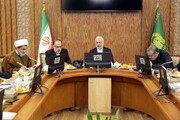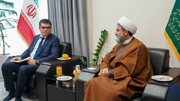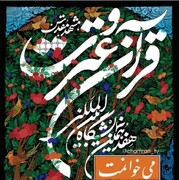Mashhad
-

Imam Reza Intl. Congress guests exchange views over spiritual perfection, better world: experts
A number of famous Iranian intellectuals and elites highlight important role of Islamic and Razavi teachings in driving mankind towards spiritual perfection and a better life during their lectures and discussions in the 6th Imam Reza International Congress underway in Mashhad.
-

Top Quran reciters, memorizers awarded at Imam Reza shrine
Top participants of the 41st International Quran Competition of the Islamic Republic of Iran were honored in a ceremony at Imam Reza shrine in Mashhad, northeast Iran.
-

AQR plans to facilitate pilgrimage to Mashhad for Iranians abroad
The fifth session of Imam Reza Taskforce was hosted by Astan Quds Razavi in the northeastern Iranian city of Mashhad in a bid to pave the way for Iranians abroad to visit Imam Reza shrine.
-

Imam Reza Stadium example of Iran’s progress in developing sports infrastructure
Imam Reza Stadium shows Iran's remarkable progress in developing sports infrastructure following victory of the Islamic Revolution. Construction of this stadium, built based on international standards and with modern facilities, is a clear response to those who do not see this capability and potential in Iranian specialists.
-

Expansion of cultural and educational relations between AQR, Turkey
In a meeting with the new Consul General of Turkey in Mashhad, the Deputy for International Affairs of Astan Quds Razavi expressed readiness of Imam Reza shrine to expand cultural and educational relations with Turkey.
-

2nd meeting of Natl. Imam Reza working group underway in shrine
The second meeting of National Imam Reza working group got underway in Imam Reza shrine in the northeastern Iranian city of Mashhad.
-

Imam Reza shrine significant presence in Quran exhibition
Offering its Quranic achievements and performing attractive wisdom programs, Quran Center of Imam Reza holy shrine has had a significant presence in Mashhad’s International Exhibition of Quran and Itrat.
-

Imam Reza shrine custodian, Aalulbayt Center present Razavi Mashhad Mus’haf to Ayatollah Mortazavi
Imam Reza holy shrine’s chief custodian, Hoj. Ahmad Marvi, and Aalulbayt Global Information Center have jointly offered a copy of Razavi Mashhad Mus’haf to salient Shia authority of imitation and a distinguished figure of Khorasan seminary school, Ayatollah Seyyed Hasan Mortazavi.
-

Imam Reza shrine custodian, Aalulbayt Center present Razavi Mashhad Mus’haf to Ayatollah Sistani
Imam Reza holy shrine’s chief custodian, Hoj. Ahmad Marvi, and Aalulbayt Global Information Center have jointly offered a copy of Razavi Mashhad Mus’haf to salient Shia authority of imitation, Ayatollah Seyyed Ali Sistani.
-

Prominent seminary scholars, teachers meet Sheikh Zakzaky
A group of seminary scholars and teachers from Mashhad, northeastern Iran, has met with Sheikh Ibrahim Zakzaky.
-

Razavi Hospital’s nuclear medicine, a safe haven for cancer patients
As the biggest and most advanced nuclear medicine center in the country’s east, Razavi Hospital’s nuclear medicine ward has been able to provide treatment services for the cancerous patients by producing ten radiopharmaceuticals.